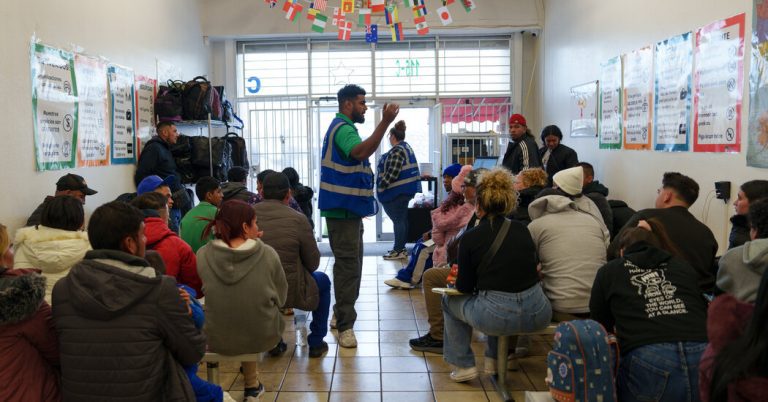The Biden administration on Friday issued sweeping extensions of deportation protections for hundreds of thousands of people from Sudan, Ukraine and Venezuela, in a move that makes it nearly impossible for President-elect Donald J. Trump to quickly remove the benefit when he takes office.
The extension of Temporary Protected Status, as the program is called, allows immigrants to remain in the country with work permits and deportation shield for another 18 months after their current protection expires in the spring. Late last year, Secretary of State Antony J. Blinken recommended the protection be extended in a series of letters.
For decades, Democratic and Republican administrations have mandated protections for citizens of countries in turmoil and deemed too dangerous to return. President Biden expanded on who could receive the status as war broke out in Ukraine and instability hit countries like Venezuela and Haiti.
“These designations are rooted in careful review and interagency collaboration to ensure that those affected by environmental disasters and instability are afforded the protection they need while continuing to make meaningful contributions to our communities,” said Rep. Adriano Espaillat of the New York, the president of the Congressional Hispanic. Caucus.
Mr. Trump has pledged to end the program, at least for some countries. Immigrant advocates have been urging the Biden administration to expand it to many of those countries before he takes office.
In his first term, Mr. Trump ended the status for about 400,000 people from El Salvador and other countries, arguing that conditions there had changed and protection was no longer warranted. The move was challenged in court and did not take effect, but he is expected to try again in his second term as part of his promise of mass deportations.
According to the Congressional Research Service, more than one million immigrants from countries in Latin America, the Caribbean, Africa and the Middle East had temporary protection status by 2024.
The move makes it difficult legally for Mr. Trump to withdraw protections for citizens of the four countries, at least until they expire sometime in 2026.
“Because President Biden has extended protections for nationals of all these countries, President Trump will not be able to deport these people anytime soon,” said Steve Yale-Loehr, an immigration scholar at Cornell Law School.
“Trump cannot ignore what Congress wrote into law in 1990,” he said.
About 600,000 Venezuelans who currently have protection will be able to renew and remain in the United States through October 2026, and about 232,000 immigrants from El Salvador will be able to do so. More than 100,000 Ukrainians will also be able to remain in the United States through October 2026. About 1,900 people from Sudan will also be able to renew their status.
The program was signed into law by President George H.W. B. Bush to ensure that foreign nationals already in the United States can remain in the country if it is unsafe for them to return home due to natural disaster, armed conflict, or other unrest. .
On the campaign trail, JD Vance, the vice president-elect, called the program illegal when he criticized Haitians who had settled in his home state of Ohio and benefited from it. Haiti is experiencing political unrest and gang violence, and about 200,000 of its citizens are protected from removal by TPS until early 2026.
“We will stop making massive Temporary Protected Status grants,” said Mr. Vance in October.
Critics have argued that temporary protections are repeatedly extended and serve as a de facto means to allow people to remain in the country indefinitely, contrary to its intention to be a short-term solution.
While the program has become almost permanent for many immigrants, it also highlights how troubled many corners of the world are and the failure of Congress to pass legislation to update the US immigration system to the realities of modern global migration.
Immigrants from many countries, including El Salvador, Honduras and Nicaragua, have been eligible for protection for more than two decades. Other countries have recently been added, such as Ethiopia, Lebanon and Syria.
If the status were eliminated, hundreds of thousands of immigrants would immediately become illegal residents of the United States unless they immediately departed. Many of them have US-born children, businesses and jobs in sectors that rely on immigrant labor, such as construction, hospitality and health care.
In cities like Denver, the temporary regime has allowed thousands of Venezuelans, who have arrived over the past two years from the southern border on buses provided by Republican Texas Gov. Greg Abbott, to work there legally and integrate into the economy.
Mike Johnston, the city’s mayor, said he applauded the Biden administration’s announcement to extend the designation.
“In Denver, people with Temporary Protected Status are doing critical jobs, contributing to our economy and becoming integral members of our communities,” he said.
Gonzalo Roa, 43, a Venezuelan who is a beneficiary in Columbus, Ohio, said he was worried about the program’s fate.
“It’s great news that it’s being renewed,” said Mr. Roa, who works at a car dealership and runs a small restaurant with his wife.
Without the regime, said Mr. Roa, would lose his job at the dealership and his two Venezuelan-born children would be ineligible for college scholarships and other benefits that require legal status.




